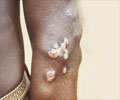Scientists at the Stanford University School of Medicine say that the hair sheep may be key to better diagnostic tests in developing world. Hair sheep is a less-hirsute version of the familiar woolly barnyard resident.
The researchers have found that not only are these ruminants low-maintenance and parasite-resistant, they're also perfect blood donors for the microbiology tests necessary to diagnose infectious disease in the developing world.Writing about their work in PLoS ONE, they point out that identifying microbes from a patient's urine or sputum requires growing those microbes in culture dishes filled with gelatinous agar and a small amount of blood.
They say that the blood provides nutrients to the growing bugs, and also provides clues as to the microbes' identities: Microbiologists can rule out or identify certain strains of bacteria based on how the organisms interact with the blood cells in culture.
Generally, microbiologists in the developed world use sheep or horse blood. However, in many places, horses are prohibitively expensive, and regular sheep, with their constant need for shearing and tendency to get infections, are difficult to keep alive.
Importing animal blood can't be feasible because shipping is costly and often unreliable.
Dr. Ellen Yeh, a resident in pathology at Stanford, says that many labs in the developing world use human blood, often donated by lab technicians themselves, but diagnostic tests aren't standardized for human blood.
Advertisement
She further says that the use of human donors increases technicians' risk of infection with blood-borne diseases.
Advertisement
She wasted no time in learning about the animals, finding that they resist parasites, don't need to be sheared, and do well in the tropical climes prevalent in much of the developing world.
Her team collected blood from hair sheep, created test cultures using the blood, and ran a series of common diagnostic tests, in order to determine whether the blood was equivalent to horse or sheep blood.
"It worked for every single thing," Baron said.
The researchers also found that they could collect the blood in donation bags, much like those human donors might see at the Red Cross.
Baron and her colleagues have found that hair sheep blood collected in donation bags performed the same as defibrinated blood.
The researchers now say that the only hurdle is getting the sheep to the labs that need them.
Two veterinary labs in Botswana already provide hair sheep blood to local labs based on Baron's initial results, and the researcher is now lobbying the charity Heifer International to add hair sheep to its catalogue so that microbiologists can donate and send the animals to the developing world.
After all, she said, the sheep can provide milk and meat - and that's on top of their role as donors of blood that, in her words, "works perfectly for every microbiology test that a laboratory would need to do."
Source-ANI
TAN















